How to get more bookings on Airbnb
This article is for you if your B&B is already up and running, or if you are about to create an account on the Airbnb platform.
If you haven’t got a property yet, do yourself a favour and read this guide on how to pick the right one.
A property’s location and size are fixed characteristics that cannot be changed later. Yet they have an outsized impact on profitability. It’s critical that you inform yourself before securing your holiday house.
I was naive and uninformed when hunting for my vacation rental property. As soon as my B&B got going, I realised that it’s the wrong size.
This mistake costs me $6000 per year. And there’s not much I can do about it.
It really hurts that this significant cost recurs yearly. I wish I had known better.
Let’s get back to the topic at hand. In this article I will teach you how to get more Airbnb bookings like a pro.
How to work like a pro
Whether we like it or not, operating a B&B means we're running a business. Maybe it's a side business. Maybe it's part-time. It's still a business at the end of the day.
In a business, the functions that are responsible for growth are sales and marketing.
So then, to grow our Airbnb income, we need to do sales and marketing!
People who are unfamiliar with sales and marketing may have the impression that it's all slimy stuff. That you have to do things you're not proud of.
If I'm honest, I used to think like this too. Until a colleague asked me to read the sales book Predictable Revenue.
As a software engineer who likes to work methodically, I was blown away by how methodical the author was.
It turns out that great sales people get their results by working systematically. I thought it was all about hassling and pestering potential buyers.
If you want to be a pro in growing your Airbnb profit, you need to think systematically too.
Airbnb funnel
Since reading Predictable Revenue, I became a lot more open minded about sales and marketing. I even picked up a few ideas from these disciplines.
One of them is the concept of sales funnel, which has prospects at the top of the funnel and converted paying customers at the bottom.
We can apply this notion to Airbnb.
At the top of the Airbnb funnel is the prospects - people may potentially book your B&B.
At the bottom, you have guests who end up booking with you.
There are always many more prospects than guests. For example, out of 200 people who are potentially interested, only 10 make a booking.
If you chart prospects and guests visually, they form a funnel. Hence the name.
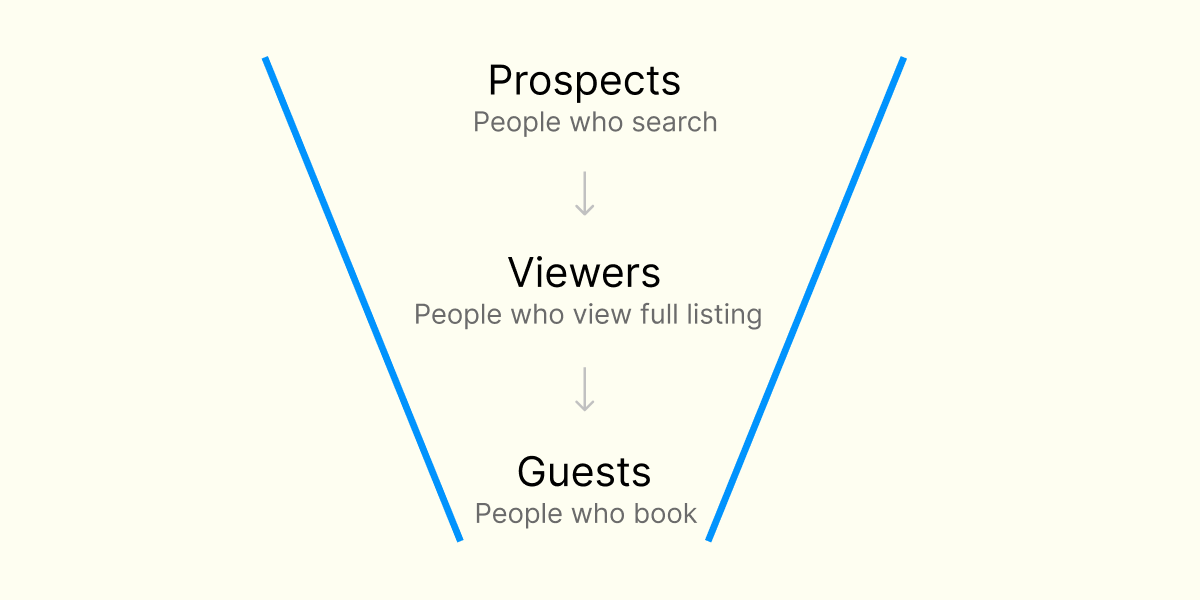
(The folks at Hubspot are experts in sales and marketing. If you're still confused, here's their explanation of the sales funnel. Obviously the breakdown of the traditional sales funnel is different from Airbnb funnel.)
It goes without saying that as a host you want to have as many people reach the bottom of the funnel as possible.
The good news is this is something that you can influence.
There are 3 metrics at play in the Airbnb funnel that you can try and increase:
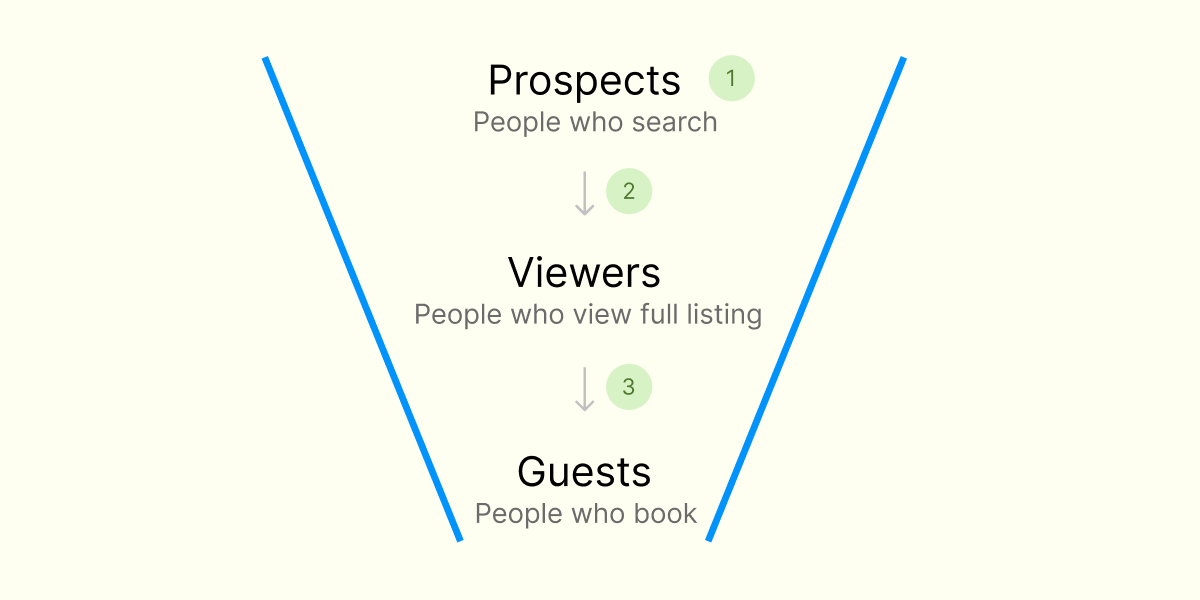
1. First-page search impressions - This counts the number of times your listing appears on the first page of search results.
It is common knowledge that the top 3 websites returned in a Google search get clicked over 90% of the time.
The behaviour of Airbnb users won't be as extreme as this, but being included in the first page will increase your booking chances a great deal.
2. Search-to-listing conversion - This is the rate at which prospects become viewers. In other words, the percentage of prospects who click into your full listing page after seeing it in search results.
3. Listing-to-booking conversion - This is the rate at which viewers become guests. It is the percentage of viewers who book your place after viewing your full listing page.
If you're good at maths or finance, you may have worked out that the funnel metrics compound. A small increase in each stage will add up to a fairly sizeable total gain.
Borrowing ideas from sales and marketing has taken us quite far. Now let's go further and borrow from the tech industry.
The startup space has a set of metrics called the "pirate metrics", consisting of 5 metrics, which are abbreviated to AARRR.
I'm not joking. It's real.
The last two metrics, Retention and Referral, apply to our B&B business. In the context of Airbnb, Retention refers to repeat guests who re-book our B&B. Whereas Referral is about bookings made as a result of word of mouth.
Adding Retention and Referral to the end of our funnel gives us this 5-stage funnel:
- First, your listing appears in a search.
- Then it gets clicked and viewed.
- Then a booking is made.
- The guest may tell their family and friends about your accommodation.
- The guest may also return and re-book the property.
Let's discuss how we can optimise each stage, so you can reap the compounded gain!
Stage 1 - Searching
Your listing’s position in search results matters a lot, obviously.
In my SEO guide I explain that a listing with low bookings will rank low in search results.
This can result in a vicious cycle.
Your poorly ranked listing lacks visibility, so it doesn’t get booked. No bookings means poor ranking. And on it goes.
If you reach this point, Airbnb is no longer getting you bookings, so you have to do it yourself. It’s the only way to break the vicious cycle.
It’s hard work. But recovery is possible.
Here are a few ideas to get your own bookings:
Family and friends - Who do we turn to when times are tough? Family and friends, of course! Ask if anyone is going on a vacation. Try and persuade them to stay at your Airbnb instead of going interstate or overseas.
Local businesses - See if you can get businesses to exchange flyers with you and cross-promote. From my experience newly launched businesses will readily agree. Find that tour operator or baker who just set up shop nearby.
Local events - Open your eyes and ears to events in the area. Is anyone running a workshop nearby, whose attendees travel from afar? Could they stay at your Airbnb? What about public sports events? Bicyclers like to rent local accommodation and make it their base for an event.
Social media - I'm not a social media person. I haven't tried this myself. But I can imagine regularly sharing beautiful photos of your accommodation and surroundings can get you some following on the likes of Instagram.
Local media - Can you get any local travel site or Facebook group to post about your B&B?
None of this is easy work, I’ll admit.
But it’s critical that you try and get a few bookings from off-platform channels. This should begin to improve your Airbnb’s visibility.
You then want to optimise how your listing presents itself in search results, in order to increase its click-through rate (aka search-to-listing conversion).
Simply appearing in search results won't do you any good if people don't click through to view your full listing.
My recommendation below looks full on. But it’s all worth it.
If you do it right, you will see a marked increase in your bookings.
Here’s a holistic strategy for improving your Airbnb as a business:
Demographics mapping - Identify the different types of guests who visit your area. I call them segments. Using the stats from traffic counting (next step) as a guide, pick 1 primary target segment, and no more than 3 secondary.
You want a primary segment that is large enough to generate the bookings that you desire, yet not too generic or competitive.
For example, ‘beach goers’ make a poor primary segment. Yes, it’s a large group, but it’s too generic.
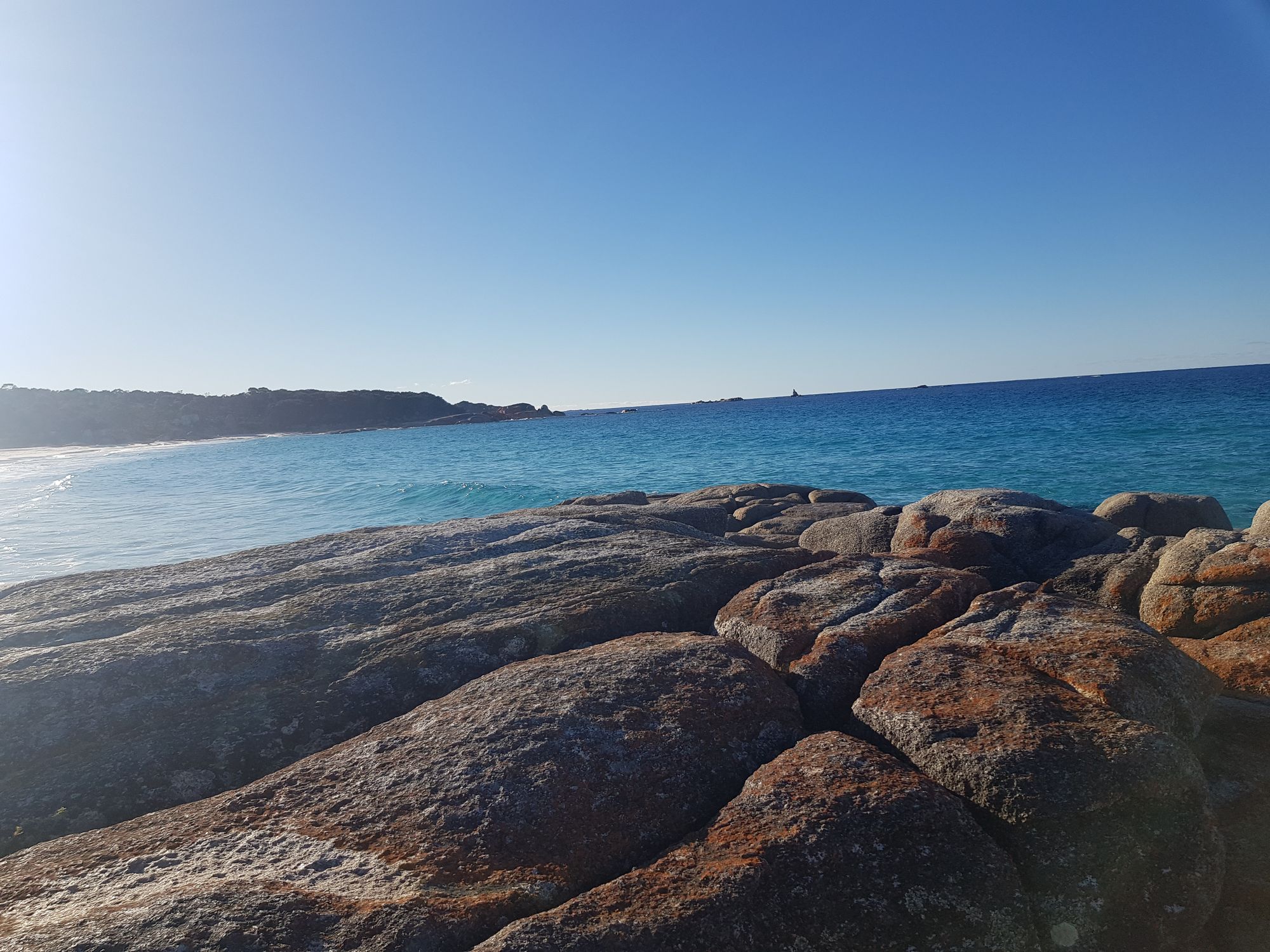
Targeting a generic segment doesn’t help you stand out. What are you going to do that will make you different from hundreds of other hosts who’re pursuing the same audience?
A narrow target segment, on the other hand, will give you plenty of ideas to be unique. You’ll have a much better chance at winning.
Traffic counting - Get to know your area. How many visitors does it get weekly? You don’t need to be super accurate. Ballpark figures will do.
Good old fashioned “people counting” on the main streets works well enough.
You can’t just have one single total though. You need to break it down. You want to know the size of each segment.
The idea here is to collect data that will help you select target segments that are not too competitive, while being big enough to net you a healthy revenue.
Yes, I am aware of commercial research tools that can help with this. I had a quick peek at one but it's inaccurate for my specific scenario. My theory is that those tools are great for broad averages. But I wanted that extra competitive advantage, so I scouted locations in person in order to pick the best property possible.
Design your property for the primary segment - Make your property as desirable as possible to your primary segment. Change or add your furniture / appliances / decorations / plants / games / etc.
You want to create a genuinely good space for your primary segment.
Yes, you'll have to spend money, but it doesn't always have to be much. Not every segment demands a newly renovated (remodelled) kitchen. Sometimes a few inexpensive changes can take you quite far.
Having said that, if you can afford to go the extra mile, I'd suggest that you do.
Compared to "just" a good place, a great one will have that much more pulling power.
The photos will look more appealing. It'll be saved on more Wishlists. It'll be spread through word of mouth. It'll get better reviews.
These things add up.
Opportunistically “kill 2 birds with 1 stone” - Since you’re already redesigning your property, can you accommodate your secondary segments for free?
For example, if ‘well to do couples’ is your primary segment and ‘wedding goers’ are secondary, then focus on the luxury and romantic aspects of your Airbnb. It will please both groups.
Optimise your listing summary as it appears in search results - Your job here is to entice your target segments to click your listing whenever they see it in search results. This is where all the previous steps pay off.
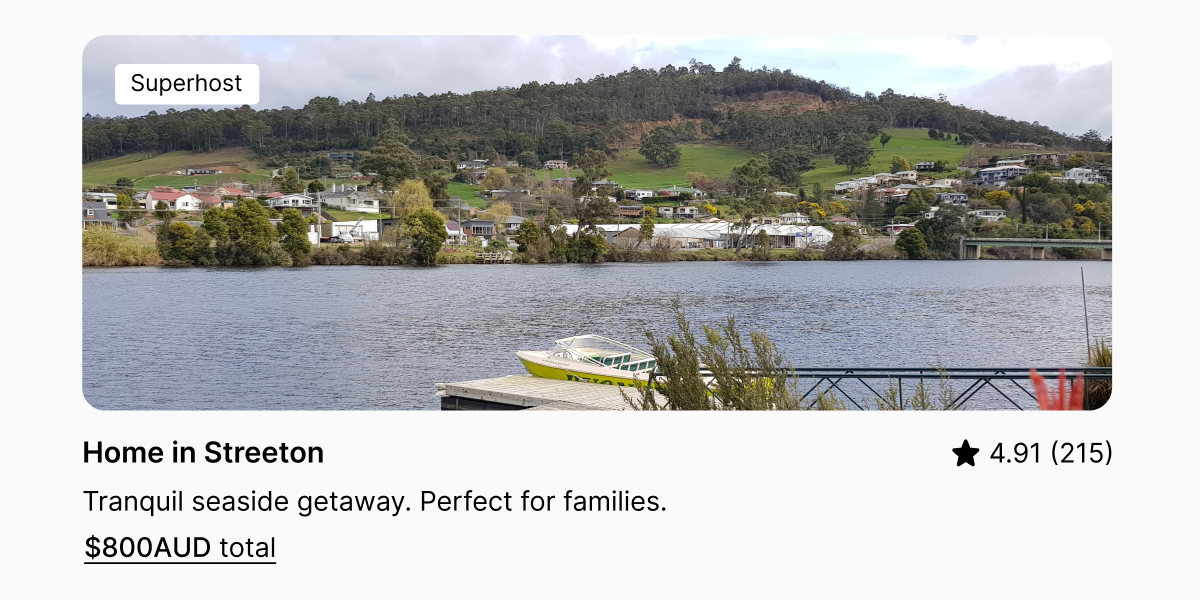
Re-word your title to make it appealing to your target segments. If you can’t impress everybody, it's fine. Just write a great title for your specific target segments.
Mention unique qualities that your target segments appreciate, that make you stand out from the rest. For example if your target segments like quiet seclusion, and your B&B is one of a few that can provide it, then include the word 'secluded' in your title.
Use attention-grabbing words. Tranquil. Retreat. Contemporary. Avoid words that are overused by your competitors. For example the word 'luxury' loses its meaning if all listings in the area include it in the title. Don't stretch the truth either. A townhouse in a crowded complex shouldn't be titled 'fresh air'.
Select a thumbnail image that is irresistible to your audience. Elicit the “I must have that” reaction.
Finally, pick a price point that is just right for the target demographics. If you’re just starting out you can undercharge slightly. But don’t do it once you’re established. Undercharging can backfire.
Good reviews and the Superhost label are something that you want to aim for in the long run, but it's out of your hands in this step.
Extreme measures - If your listing currently ranks so low that it virtually never appears in search results, you may need to take more extreme actions. You can read about them here.
Stage 2 - Viewing
A potential guest reaches this stage by clicking through to your full listing from search results.
Here you benefit from demographic mapping once again. Description, photos, amenities - custom tailor everything so it fits your target segments like a glove.
When a B&B fits so well, it creates a sense of urgency to book.
You want your audience to think to themselves “This is perfect in every way. Missing out would be so annoying.”
Description - People don't like to read a wall of text. You need to find the sweet spot between selling your property as much as possible vs keeping it short.
Photos - Better photos will convert better on marketplaces (Airbnb is no exception). This has been proven statistically using A/B experiments.
If you can get professional photography done, do it.
Some hosts get by through using a high-end phone camera and paying attention to lighting, angle, and contrast.
Sort your photos so that your most impressive photos show up first. Not every potential guest will scroll through all of your photos.
I find that high resolution photos get scaled down by the Airbnb platform, making them blurry. From my experience it's better to upload medium resolution photos to minimise blur.
Stage 3 - Booking
This is the holy grail. The most vital part of the Airbnb funnel.
Your potential guest has seen your amazing photos, and read your compelling title and description. Thanks to your demographic mapping work, they feel that your B&B is just the perfect fit.
The last three hurdles before they book are:
- Are you making it convenient to book?
- Do they like your price?
- Can they trust you?
Convenience - At this point your guest is one step away from spending money. You want to remove as many barriers as possible. This is why I turn on Instant Bookings.
The one barrier that I keep is the requirement for the guest to have a Profile Photo. I find that people behave more responsibly when their face is at stake.
My Cancellation Policy was initially set to Moderate. Now it's Firm because a few guests took it too far with the generous Moderate cancellation policy. As a side bonus, my cleaners are happy about fewer late cancellations.
Pricing - You want to pick a price that is just right for your target segments.
Here's how you know that you've landed on the right price:
- Picture a guest from your target segments
- Select a price point that would slightly irk both the host (you) and the guest
- The middle ground is reached when both sides were to feel slightly ripped off
In special circumstances, it may make sense to lower your price temporarily to below fair market price. For example, when your listing is new with zero bookings and reviews.
I want to caution you against an overly low price, though. It can give the impression that your accommodation is lower quality that it really is. Or it can give off a scammy vibe.
An artificially low price should always be temporary. Once your short-term goal is achieved, you should return to a fair market price.
I have a few words about extra fees. Guests don't like them. To them extra fees feel like a shady scheme to rip them off.
I also don't like extra fees. They encourage guests to act more "entitled" since they've paid for whatever it is that we're charging extra.
I only have nightly rates. That's it. No cleaning fees or the sort.
Trust - To your guests, their holiday trip is a big deal. It's probably something they've been looking forward to all year long.
So they want to be assured that you are dependable, and that the accommodation will have no issues whatsoever.
They gauge your dependability by checking your Superhost status and reading your Reviews. If you've only just started, you're out of luck, but you can convey reliability through other means.
Impress them through 100% Response Rate and short Response Time. Say something reassuring in your Profile's About field. Likewise, explain your communication and check-in process in the Interaction with Guests field.
In short, you want this block at the bottom of your full listing to inspire confidence:
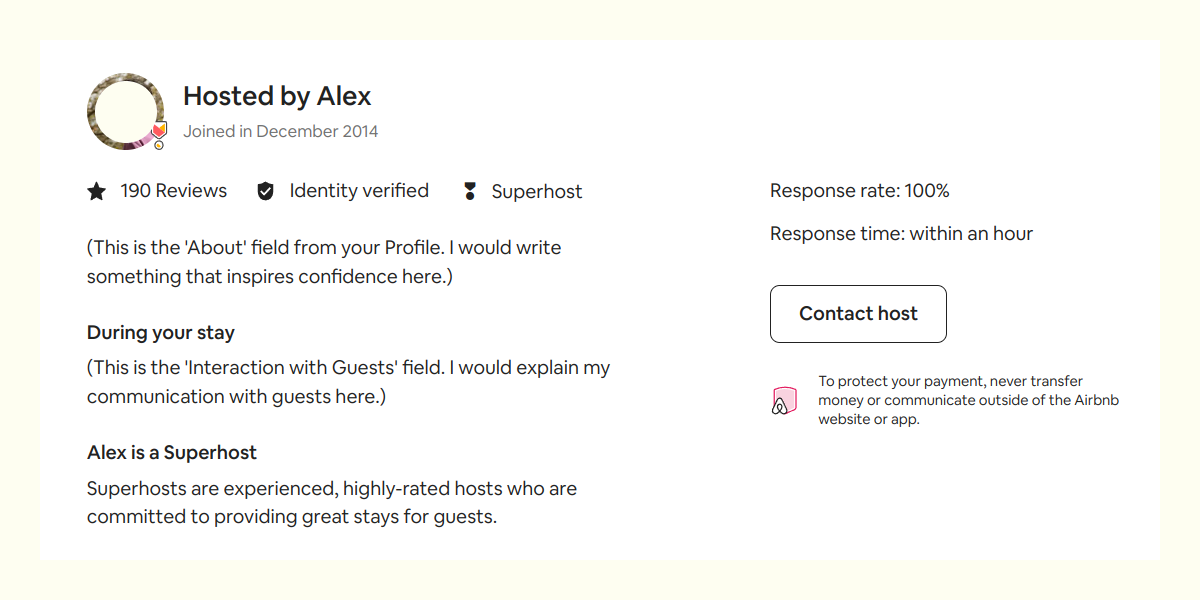
You can also use your listing's Description field, which shows up much higher than the profile block, to say a few words that put them at ease.
Stage 3.5 - Staying
You should write a review for every guest who has completed their stay. My article about reviews establishes that guests tend to reciprocate. Your review submission nudges them to review you.
Stage 4 & 5 - Referring and Re-booking
A guest's journey doesn't end with their booking. They may come back and stay at your accommodation the second time. They may also tell their friends about your amazing B&B.
I will cover these in a future article.